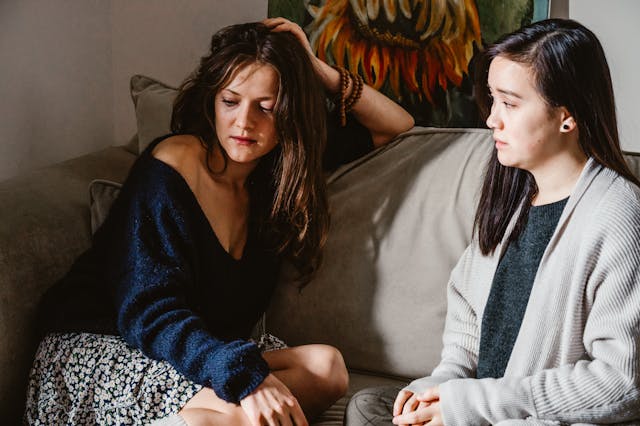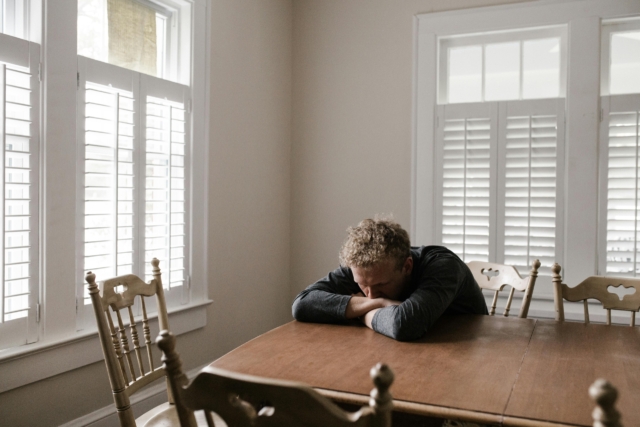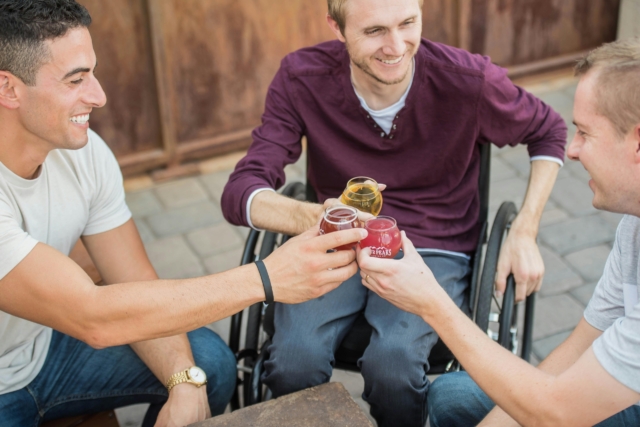How to Keep Healthy Relationships and Maintain Your Wellness When You’re Ill

It’s such a heartbreaking feeling to see ‘everyone’ having fun with their friends, while you’re stuck at home all alone. And not just that; those happy stories and photos can serve as a reminder of all the people who are no longer in your life now that you are sick.
Who hasn’t heard the saying that tragedy and hardship make you realize who your real friends are? Losing friends is one of the most common fallouts of going through tough times – and that surely includes living with a chronic illness.
As painful as it is, it’s not necessarily anyone’s fault when friendships end or fizzle out. After all, it is challenging to stay connected when you often can’t meet up or have to cancel plans last minute because your symptoms flare up. You may grow apart because your friend doesn’t really understand what it’s like to live with crippling pain and fatigue every day, and you’re too wrapped up in your own problems to care as deeply about office gossip and disastrous dates as you used to. You’re living in different worlds now, with less opportunities to catch up and bond.
But that doesn’t make it hurt any less that your bestie isn’t by your side through the worst time of your life. That your friend group seemingly just moves on without you, just when you need their support the most.
How do you deal when friendships end because of chronic illness? Just like romantic breakups, there’s no right or wrong way to cope with heartache, but here’s some general advice on what you can do when you’ve lost friends.

Every friendship changes over time, and people will come and go in your life. Accepting this reality can help you cope, but it’s still totally normal to grieve the end of your friendship.
After being friends for years, you’ll miss the inside jokes, your shared history and all the things you’ll never get to do together again. You may also feel let down, disappointed, hurt or betrayed after confiding in them. Let yourself go through all these emotions and give yourself time to heal.
However, don’t get stuck reminiscing the good times or feeling resentful, abandoned or upset about the breakup. If you’ve been cut off without explanation, don’t keep going over possible explanations in your head. You might never get the answers you need – and it will probably still hurt if you do.
So instead, take good care of yourself. Aside from getting enough sleep, pamper yourself with healthy comfort food and stretch your legs regularly to clear your head. Mindfulness exercises can help you to stop obsessing over what’s happened, whereas taking up fun activities will offer some positive distraction.
Do you need some closure? You could write a letter to your former friend (that you won’t send) saying all the things you wish you could tell them or pack up reminders of your friendship like photos and gifts. Create your own ritual to say goodbye so you can put this part of your life behind you and move forward.
Of course you’re upset, disappointed, angry or jealous. You have every right to feel that way when you lose someone who used to mean a lot to you. But blaming your former friend only intensifies your suffering.
Even if you feel that you would have stuck around and been supportive if it were the other way around, there’s no point in comparing hypothetical situations. Because you now know what it’s like to experience constant pain, depression and loneliness, and your friend probably doesn’t.
Sadly, not everyone can put themselves in other people’s shoes, and not everyone can handle difficult emotions well – from themselves or others. So there’s little point in playing the blame game when friendships end.
And that includes judging yourself harshly. Try not to take your friendship ending too personal – even though it does feel that way. Your circumstances have changed, probably a lot, and not everyone who’s fun to hang out with will be a shoulder to cry on. People usually bond over something they have in common: playing sports together, going out with a group of mates every weekend, having kids of the same age… And now that you can no longer share that activity or similarity, you slowly drift apart.
So please know that, if your friends stop seeing you, it says much more about the situation you’re in than about you. Do not let these breakups define your self-worth.

Just because you’re not trying to blame anyone doesn’t mean you can’t do some self-reflection about your friendship break-up.
Looking back on this experience, what could you do differently in (new) friendships? There’s no need to overanalyze everything that’s beed said or done, but you could identify specific dilemmas or obstacles you’ve faced – and what you can do to overcome them in other relationships.
Maybe you struggled to relate to your former friend’s life, and you can make more effort to stay interested in people’s activities, even that feels frivolous compared to what you’re going though. Or perhaps you could communicate your limitations more clearly, so the people in your life have realistic expectations of what you can and cannot do, leading to less confusion and unpleasant surprises.
Again, you shouldn’t be hard on yourself, but reflecting on what’s happened could help you get some useful insights.
Losing a friendship can be extra painful if you don’t have the energy, mobility or mental capacity to maintain a buzzing social life. But you can still reach out to other people in your life and strengthen your relationships with them.
Call your parents or siblings to share your story. Reconnect with old friends from school, college or work to catch up, even if it’s just a few text messages. When you’re able, go to birthday parties and other celebrations, and introduce yourself to friends of friends. If you don’t have a lot of family and friends nearby, just start by saying hi to your neighbors or that girl you keep running into at the gym.
Are you feeling lonely since losing your friend? See if you can make new friends – yes, even with your symptoms and practical limitations. Join (online) clubs or groups with common interests or seek out people who do understand what you’re going through, in patient support groups or chronic illness communities.
Animals can be an amazing source of support too, so cuddle your pet or visit a local shelter. If you can, don’t be afraid to venture out on your own, to the library, church, farmer’s market. Who knows, maybe you’ll run into a friendly face!
But also don’t confuse being on your own and emotional loneliness. You can be a room full of people and still have that hollow feeling inside that nobody truly gets you. That requires a different approach than social isolation, so try to identify what’s troubling you most.

When you’re hurt about your best friend who didn’t come to visit you in the hospital or that fun colleague who never checked in on you since you’ve left, it’s easy to overlook the people in your life who did come through for you.
In tough times, so many of us have been pleasantly surprised by neighbors bringing food, that mom from school who offers to pick up your kids when you’re too sick, the acquaintance who keeps texting you to offer a support and a listening ear.
No, that’s not the same as having the friend who knows you deepest thoughts and feelings by your side, but it’s that kind of kindness that will warm your heart and get you through hardship.
It hurts to lose a friend the moment you need their support and understanding the most. Take the time to process all your feelings, without blaming anyone but the new situation you’re in.
See if there’s anything you can take away from the breakup, so you can strengthen your bonds with other friends and acquaintances. As sad and disappointed as you rightfully are, don’t forget to look out for unexpected kindness and new friendly faces too!
For more advice on friendships with chronic illness, read ‘How to Be a Good Friend Even Though You’re Chronically Ill’ and ‘7 Ways to Make New Friends with Chronic Illness’. You can also find tips on dealing with emotional loneliness and FOMO by clicking the links.